SAP Hybris vs. Shopify vs. Salesforce: What to Choose for Your e-Commerce Project?

Key takeaways
- Check out a comprehensive comparative table where we explore the difference between 3 top eCommerce solutions: Shopify, SAP Hybris, and Salesforce.
- Learn more about the main aspects to consider when choosing an eCommerce platform for your project.
- Explore an in-depth overview of each eCommerce giant, namely Salesforce vs. SAP Hybris vs. Shopify, and figure out which one meets your business needs most.
- Edges and drawbacks: what to expect from adopting one of the three popular solutions.
Here is the truth: many in the e-Commerce industry pursue a number of objectives choosing a new platform for online retailing. It may be a customer acquisition augmentation by going online, a substitution of outdated, poor-featured software, integration of an omnichannel or multichannel strategy, or just launching a new business focused on online operational management.
There is a myriad of eCommerce software on the market for small and midsize businesses. However, owners of enterprise-level businesses are limited (for better or for worth) to a dozen of worthwhile platforms. Despite the size of the eCommerce business, all of them are at a crossroads, facing a dilemma about what path to choose and what best practices to follow. All of them wonder whether to invest in proven large systems or try the concept with a low-cost solution, doubting whether they have enough resources of time, money, and workforce to reach strategic goals.
Customers involved in the e-Commerce quite often waver between three major platforms of the modern online merchandising industry Hybris vs. Salesforce vs. Shopify. Each of them is progressive, high-quality, self-sufficient, and profitable. Let’s elaborate more extensively on these three and see how to choose the one that will suit you most.
Table of comparison of Hybris, Shopify, and Salesforce systems
| Feature | Hybris | Shopify | Salesforce |
|---|---|---|---|
| Country of origin | Germany | Canada | USA |
| Business focus | |||
| B2B focus | 10 | 3 (claimed to have) | 3 (claimed to have) |
| B2C focus | yes | yes | yes |
| Client type | large enterprises, medium business | B2C retailers of any level | small, medium, and large business |
| Customers | 21DIAMONDS, Volkswagen, Henkel, Ericsson | MMA Warehouse, Hawkers, 2 Chainz | Adidas, Design Within Reach, YETI |
| Technical-tactical performance | |||
| Programming language | Java | Ruby on Rails | Java |
| Mobile version | yes | yes | yes |
| Mobile app | yes | yes | yes |
| SaaS | yes/no | only | only |
| Web Services /API | yes | yes | yes |
| Ease of deployment | 7 | 9 | 9 |
| Easy settings and customization | 9 | 9 | 7 |
| Technology readiness | 9 | 9 | 9 |
| Frontend speed | Can influence | Hardly can influence | Hardly can influence |
| Backend speed | Can influence | Hardly can influence | Hardly can influence |
| OS Supported | Windows, Linux, Android, iPhone/iPad, Mac, Web-based | Windows, Linux, Android, iPhone/iPad, Mac, Web-based | Windows, Linux, Android, iPhone/iPad, Mac, Web-based |
| Start for developers | 7 | 9 | 3 |
| Start for users | 8 | 8 | 5 |
| Performance | Can influence | Hardly can influence | Hardly can influence |
| Scalability | Can influence | Hardly can influence | Hardly can influence |
| Sustainable growth | 9 | 9 | 8 |
| Features | |||
| Rich out-of-the-box functionality | 8 (9 with market addons) | 5 (9 with market addons) | 7 |
| OMS (order management system) | 8 | 8 | 7 |
| Extensions and addons | yes | yes | yes |
| Sales-driven engine | 8 | 5 (7 with plugins) | 8 |
| Customer segmentation | 8 | 1* (exl. addons) | 9 |
| SEO friendly | 8 | 8 | 8 |
| Flexibility and extendability | 9 | 7 | 6 |
| Free themes | no | yes | yes |
| Library of extensions | yes | yes | yes |
| Easy to start for content managers | 7 | 8 | 5 |
| Third-party compatibility | yes | yes | yes |
| Technical support | Depends on a vendor | Good | Good |
| Import/export of category data | OOTB | OOTB | OOTB |
| CMS for content pages | 9 | 8 | 5 |
| Customizable | 9 | 7 | 7 |
| Effective cache | Exists | Not available | Exists |
| Friendly user interface | 8 | 9 | 5 |
| Changes without dev | 7 | 7 | 6 |
| Third-party integrations (availability, easiness) | 7 | 8 | 7 |
| Image Management | 7 | 8 | 5 |
| Multisite management on a single instance | 7 | 7 | 9 |
| Omnichannel commerce | 10 | 1 | 6 |
| Languages | English, China, Germany, India, Japan, Spain, France, Russia | English | English, French, Spanish, Brazilian Portuguese |
| Support | |||
| Community support | 7 | 9 | 3 |
| Version updates | Manually | Auto | Auto |
| Skilled resources | 7 | 9 | 5 |
| Pricing | |||
| Price scheme | Quote-based | Monthly payment | Quate-based |
| Free community version | no | no | no |
| Enterprise edition subscription | yes | yes | yes |
| Integrations | |||
| Default integrations | Data Hub, ERP, CSV, ImpEx, SAP CRM | MailChimp, QuickBooks, Fulfillrite, itDuzzit | No available info |
| Integration with payment systems | 7 | 9 | 8 |
| Integration with tax systems | 9 | 8 | 8 |
| Integration with shipping systems | 9 | 8 | 8 |
What platform to choose for your e-Commerce project?
Let’s say your business objectives are related to the continued steady growth with opening new units for a definite period and improvement of customer service quality, or you have already come up in the world of retailing on a local scale basis and are thrilled to start off the international market expansion. Before selecting a particular eCommerce platform, businesses, whatever their goals are, should run the solutions that are being considered through the checkpoints listed below in order not to make the incorrect choice.
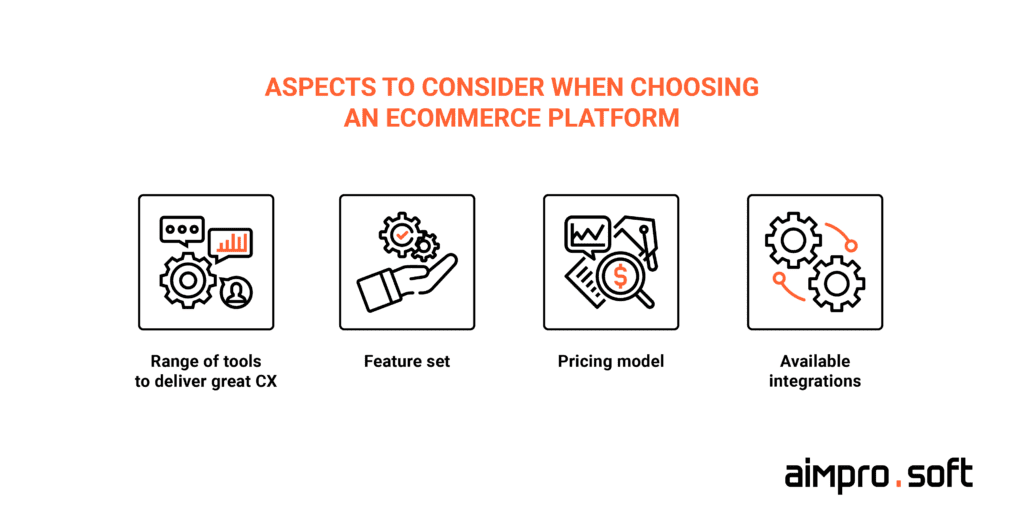
Focus on customers
If your overreaching goal is to improve a customer experience (CX) and make sure buyers can complete all transactions seamlessly, you should rivet your attention on the tools relating to the advanced search of goods, client service (online support via live chat, socials, call center, emails), customer segmentation, sales channels integration, loyal programs and other functionality that aims to set up an overwhelming control over the CX.
Thus, if you are examining Salesforce Commerce Cloud vs. SAP Hybris vs. Shopify, SAP Hybris (currently known as SAP Commerce Cloud) is honed for omnichannel needs for both B2C and B2C clients, while Salesforce Commerce Cloud and particularly Shopify are far away from the ideal omnichannel vendor.
Agree on features
Prior to embarking on searching for the perfect e-Commerce solution, we recommend you to make a spreadsheet with all desired features according to the business objectives and define for yourself which of them are affordable and can help you conduct all commerce operations efficiently, and which can result in the overhead. It may happen you do not need the B2B-focused features of Hybris, so there is no sense in buying the subscription. For instance, in the context of a comparison of Shopify vs. SAP Hybris, the simplicity of Shopify with a basic set of features for a quick start and a responsive community will do a good turn.
To make a comprehensive feature set of e-Commerce stores for B2C and B2B segments, we would better dedicate a single post. Now let’s go over some basic features which are essential for any online store:
- СMS
- Cart increasing purchase intent
- Painless checkout process
- User-friendly UI conducive to purchasing
- Promotion and discount program tools
- Analytical and reporting tools
- Popular payment, tax, shipping integrations
- Scalability for unhampered growth
- Online marketing integrations
- SEO-friendly backend and layout
- Blogging option
Consider pricing
Faltering between pricing schemes, be watchful when budgeting for your e-Commerce platform. Some traps can be related to subscriptions, payment gateway fees, or licenses. Expecting a pure pricing scheme, you can lose the fact of peripheral costs. Let’s examine this aspect in terms of comparing SAP Hybris vs. Salesforce Commerce Cloud vs. Shopify.
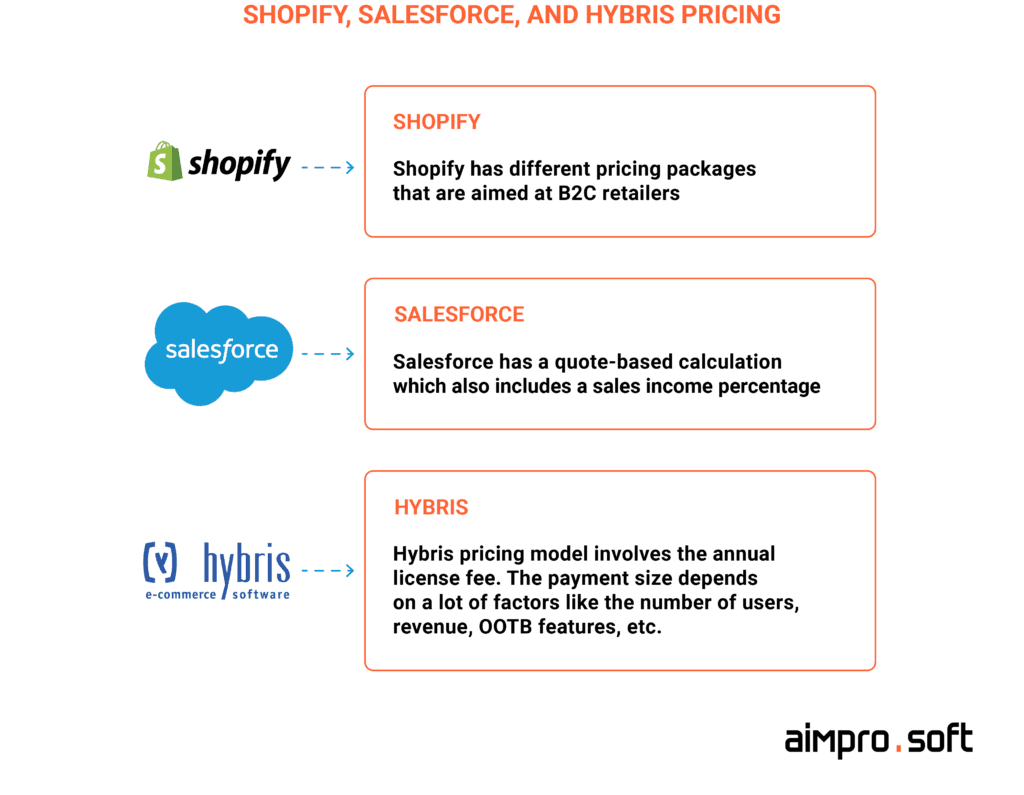
For example, enterprise Salesforce has a quote-based calculation that also includes a sales income percentage. Salesforce, former Demandware, offers services for customers with a $20 million turnover yearly. A subscription for enterprise-level e-Commerce resources starts from 1% of turnover.
In turn, the SAP Hybris pricing model involves the annual license fee. The payment size is influenced by a lot of factors like the number of users, revenue, out-of-the-box features, and discounts if you already use SAP suite solutions (SAP ERP, CRM, etc.). You can diminish development costs largely with outsourcing vendors.
When comparing pricing between SAP Commerce Cloud vs. Shopify, pricing packages of Shopify are aimed at B2C retailers of any level, starting from $29 per month and a free trial period of two weeks with the basics to start a new business. The red-hot is a middle plan of $79 for retailers with sustained growth of the business. A monthly fee of $299 waits for ambitious entrepreneurs to scale up with an advanced package.
Enterprise-grade solutions are available for those who are ready for scalable growth at an exponential rate with Shopify Plus. Prices are not publicly available. You will have to inquire about your plan feeling the web form. Shopify has payment gateway fees, also. Moreover, almost each Shopify integration also has a monthly fee.
Examine available integrations
E-commerce platforms are selected by the abundance of available features, but at the same time, lots of advanced options remain in short supply out of the box. We offer to look at this parameter while considering Salesforce Commerce Cloud vs. Hybris vs. Shopify.
The most demanded Hybris acceleration add-ons, for example, are available in the SAP Hybris Products Extensions market, sorted by four core SAP products. Those being overlooked still can be connected by any experienced SAP Hybris developer. Default Hybris integrations are the whole range of SAP solutions, Data Hub for data integration to scale up, ECC (ERP), CSV, and ImpEx.
Find out more about sales acceleration add-ons in Hybris systems.
In terms of comparison of SAP Commerce Cloud vs. Salesforce Commerce Cloud, Salesforce makes it easy to make up the shortfall of native features with the LINK marketplace of integrations. For example, if you seek tax providers to connect to your Demandware-based store, user-friendly navigation will help you to filter by technology and find what you want. Tag tips show you an area of application to facilitate your choice. Also, Salesforce displays a consulting vendor list tagged by region.
Shopify can boast of the variety of both default integrations and the availability of extensions through APIs. The platform has in its basket MailChimp, KISSmetrics, QuickBooks, and other tools to sell, make marketing campaigns, analyze, and manage finance and accounting focused on making it as simple as possible. AppStore (digital market of apps and extensions) considerably enhances the capability of the Shopify-based e-Commerce store with integrations sorted by category, price, popularity, and collection.
We also recommend reading our article on eCommerce app development.
Overview of platforms
Hybris
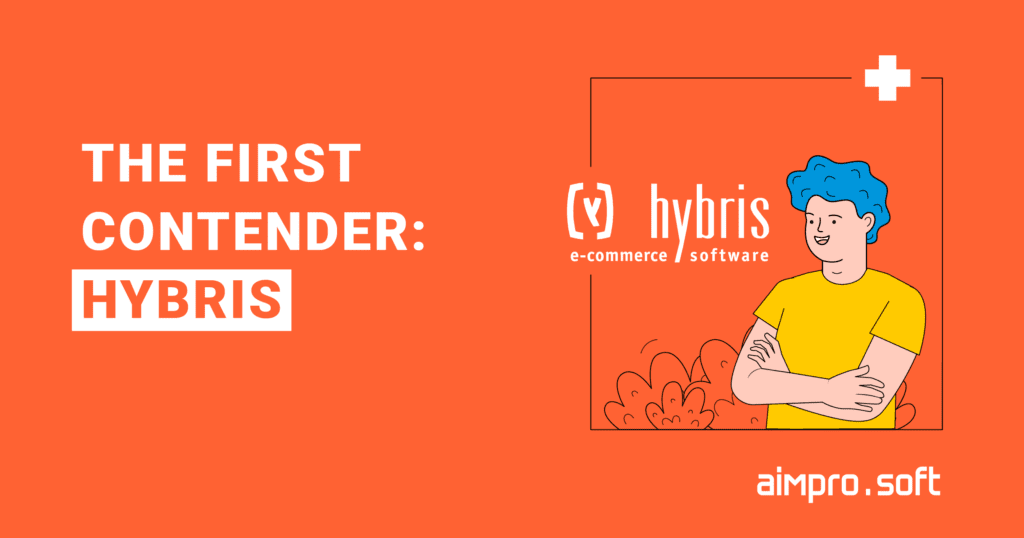
Hybris fits well for large development organizations and is perfect for a quick start with an enterprise e-Commerce project. You may appreciate a number of solutions on default, such as a responsive storefront, CMS, order management, reporting, B2B/B2C Accelerator, etc. SAP Hybris can cover the most popular customer journeys releasing you from doing customizations to a bare minimum.
Out-of-the-box (OOTB) features (promotions, gifts, payment, tax, shipping solutions) make the development time more efficient. In a pair of SAP Hybris vs. Salesforce, the latter cedes superiority of brilliant omnichannel capabilities to the absolute winner.
If you’re looking for solutions to streamline your enterprise activities, you may want to check out our article about content management systems, another type of robust enterprise-level software.
If we dive deeper into the pool of solutions that can be empowered with Hybris, we can say that based on our expertise in working with this technology, it suits perfectly middle and large retail businesses apart from small companies. However, let’s look more precisely at those products that can be a perfect match with Hybris:
-
Marketplaces. If you decide to build your marketplace not from scratch but instead opt for a SaaS eCommerce platform, Hybris is the right solution to consider. Hybris is designed to run both B2B and B2C online marketplaces providing even commerce infrastructure services as a part of core commerce functionality responsible for simple connection of third-party services. This e-Commerce software attaches great importance to search and navigation as a means of higher conversion and larger order volumes.
A payment module, which is considered a kind of the heart of the Hybris platform, can coordinate the flow of transactions between a large number of vendors, consumers, and banks. In turn, a Rule Engine module is used for bundle rules, order management, warehouse and sourcing rules, etc. It allows managing business objects under rules.
For example, sellers can create and manage dynamic and personalized promotions in the marketplace portal and monitor the results across the customer journey with the Promotion engine. These and many other capabilities of Hybris can be used to create robust and user-focused marketplaces.
Learn moreIf you are interested in building a prosperous marketplace solution but lack valuable tips to start your software development journey, our in-depth guide will be of a great help.
-
B2B eCommerce platforms. When you’re comparing Shopify vs. Hybris, Hybris is the solution to opt for if your goal is to create a feature-rich and reliable B2B platform. It is not by chance that Hybris is considered one of the leading B2B eCommerce platforms. Due to OOTB accelerators and the availability of hundreds of extensions for Hybris in the SAP marketplace, B2B e-Commerce implementation can go rather fast. This solution provides seamless integration with 3rd-party systems and offers a wide range of currencies and languages for global coverage.
B2B companies choose Hybris for its efficient order management, ability to configure custom catalogs and pricing, variety of enhanced content management features, numerous integrations with industry-specific software, versatile tools for customer financial management, built-in SEO optimization tools, and many other features that can streamline all sorts of B2B business operations.
Find outYou may be interested in checking out our article to learn more about the cost of B2B website development on the SAP Hybris platform.
-
Scalable eCommerce projects. Hybris is rather flexible and adaptable, and it can be easily adjusted to meet the demands of projects with big ambitions, which may have certain limitations at the moment but want to scale without restrictions in the future. The platform’s architecture is designed to handle high customer traffic and significant order volumes, being scalable when you need new components quickly and flexible to meet market needs. It provides companies with available components and business logic that can be easily customized for specific business processes.
For instance, we scaled a website on Hybris for one European chain of drug stores when the client changed the focus, having decided to expand his market presence and occupy the niche on the international market as well. Our developers implemented country branding (localization for multinational trade) easily since Hybris allows duplicating the business logic of the parent site without developing core functionality from scratch. It helped save our client both time and money since it takes 120+ hours for the implementation of a country-specific store depending on the required changes.
Contact our specialists and they will conduct a proper analysis of your requirements and provide consultation.
CONTACT USEdges
- Quick set up of an enterprise-level e-Commerce platform. Only one working day, and you have an environment for online trading. All that’s left is to connect extra tools.
- A wide variety of OOTB features for B2B2C retailing. Hybris e-Commerce platform was initially designed as the B2B platform, but it extremely succeeded for B2C then too.
- Scalability for unlimited growth. With Hybris, you should stock up servers and be re
Drawbacks
- Personalized support is hard to get from SAP Hybris. You should find a reliable software vendor, and the challenge will be solved.
- You may be confused with a lack of resources, but it is at first glance only. Try to discover Eastern Europe, and you will find an oasis of dedicated developers.
- Proper documentation and community support have a proprietary product only. We know that users of the Hybris e-Commerce platform suffer from a lack of supporting documentation. That’s why we try to share missing explanatory guides via posts on the Aimprosoft’s blog.
The adoption of Hybris technology requires the technical resources in-house or outsourced to a dedicated development team. The cost of skilled Hybris developers is not low reasonably. To ensure the right project kick-off, it does make sense to provide yourself with a proven implementation partner. In the raw of SAP Hybris Commerce, people in business consider Salesforce and Shopify as alternatives. Let’s proceed with Salesforce.
Salesforce
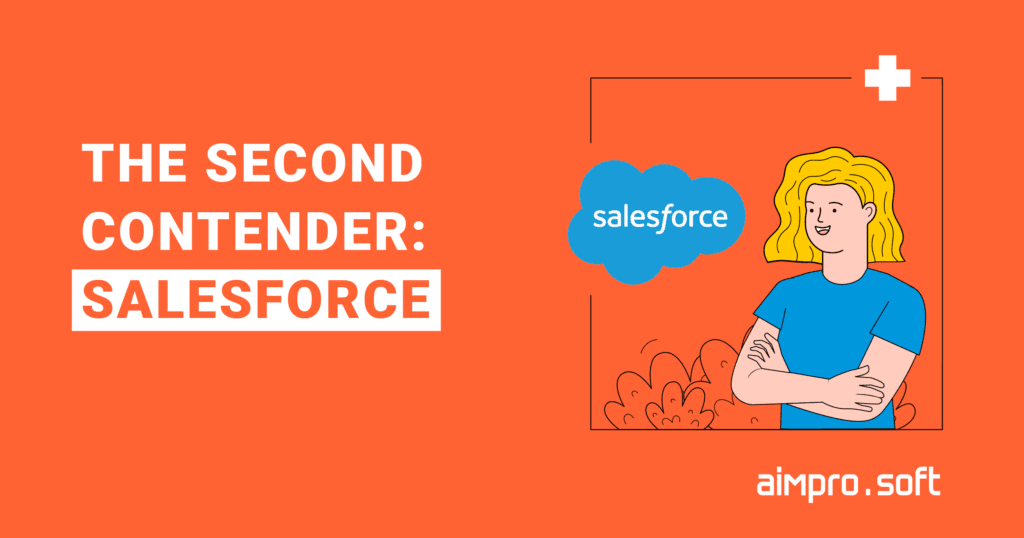
While Gartner predicted growth of digital commerce platforms up to $8.5 billion by 2020, Salesforce decided acquiring Demandware was the way to go. What are the features of a newborn Salesforce Commerce Cloud which users are fond of? Undoubtedly, the list will open a strong focus on sales representatives, whatever Tom Ebling says concerning its customer focus. The platform is pretty good at building business rules for custom marketing and promo campaigns.
Excellent performance of the platform paired with omnichannel capability for B2C intensifies Salesforce commerce suite. CRM customer data is available for users in combination with B2C commerce to get a complete interaction history of every single customer. Retailers command the platform for its prospecting and analytics and highlight the way information is organized. Sales reps have there a healthy sales pipeline visibility.
Salesforce Commerce Cloud is not good for growing mid-tier companies which are frugal in spendings. And multisite management option available from a single backend with a quick set up of a new website will stimulate business owners for more. Their AppExchange marketplace reduces resorting to the development providing customized solutions up to anybody’s taste. In Salesforce vs. Hybris comparison, they share the top rung on the ladder concerning availability and ease of integration of third parties.
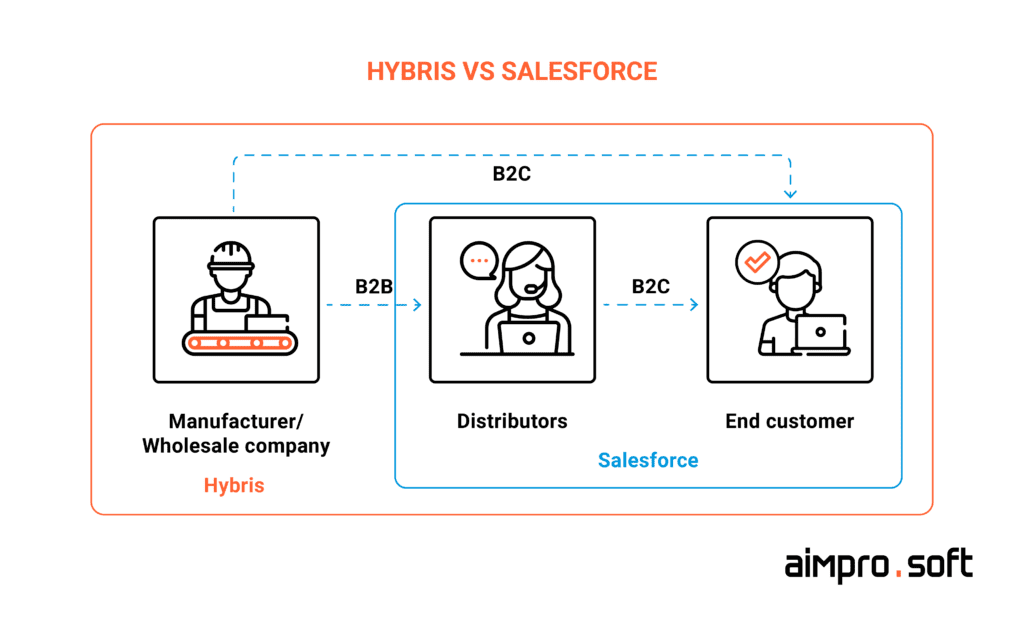
Edges
- Treatment of leads. It has an outstanding sales-driven engine to track the lifecycle of leads and provides opportunities to automate campaigns.
- Predictivity, reporting, and analytics with Einstein. It has strong AI and machine learning mechanisms that work with consumer behavior and provides the granularity of data.
- Sales income percentage. Demandware was designed initially to serve big players and free them from technical issues.
Drawbacks
- B2B opportunities are a strong point for Salesforce, while it is a natural option for SAP Hybris.
- Poor community support. In other words, outsourced Demandware developers have to mine support from their experience in the main.
- Cost. It is really overpriced for small and mid-tier businesses.
Shopify
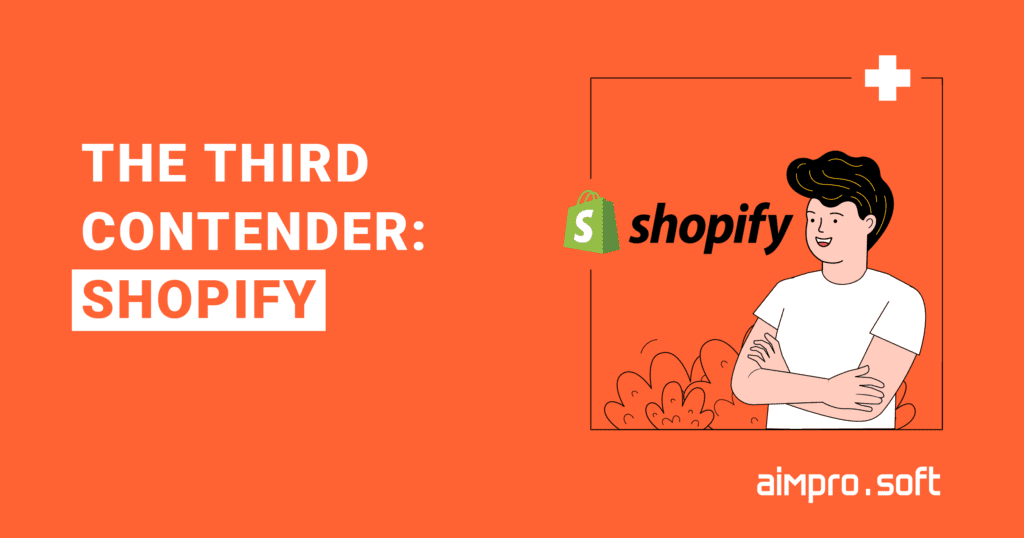
When Shopify was created, nobody of the founders didn’t even suppose the platform would able to process up to 4 mln inquiries and 10 thousand of purchases per second one day. Shopify isn’t at the core of our portfolio, but we have been delivering Shopify development services for small to medium businesses upon request. Based on our experience, customizations and connections are a common thing, while the development of new plugins is ordered very rarely.
The platform is mainstream among mid-level stores. It scores with product catalogs, CSV import, a compilation of all data in one place, and rather simple content management where no extra tools are required. In a round Hybris vs. Shopify, the first one is unquestionably stronger with order management. But at the same time, simplicity is everything. Due to its SaaS model, Shopify is easy for non-tech users and doesn’t require permanent maintenance.
Shopify is a serious contender with a drop shipping option, dozens of payment gateways, automatic taxing, and carrier shipping rates. Add to all that a classy consumer-oriented frontend, and you will have a perfect selling machine to go online; getting a payback faster will be profitable.
Edges
- Plugins. The app market is teeming with add-ons designed by enthusiasts to extend the core functionality of Shopify.
- Ease of use. Besides, Shopify is technology-ready, it is very user-friendly and intuitively comfortable to work with it.
- Low-cost business launch. For those who are unpretentious in options, it is a good start with a basic set of features for a reasonable price.
Drawbacks
- Shopify is ill-designed for stores with a wide variety of goods.
- Poor out-of-the-box categories. If you want to diversify your store with advanced filters and categorize products, adding a plugin is the only possible option.
- Businesses are limited by customizations of checkout and dynamic pricing with Shopify. Special requirements can be met with an advanced plan or add-ons only.
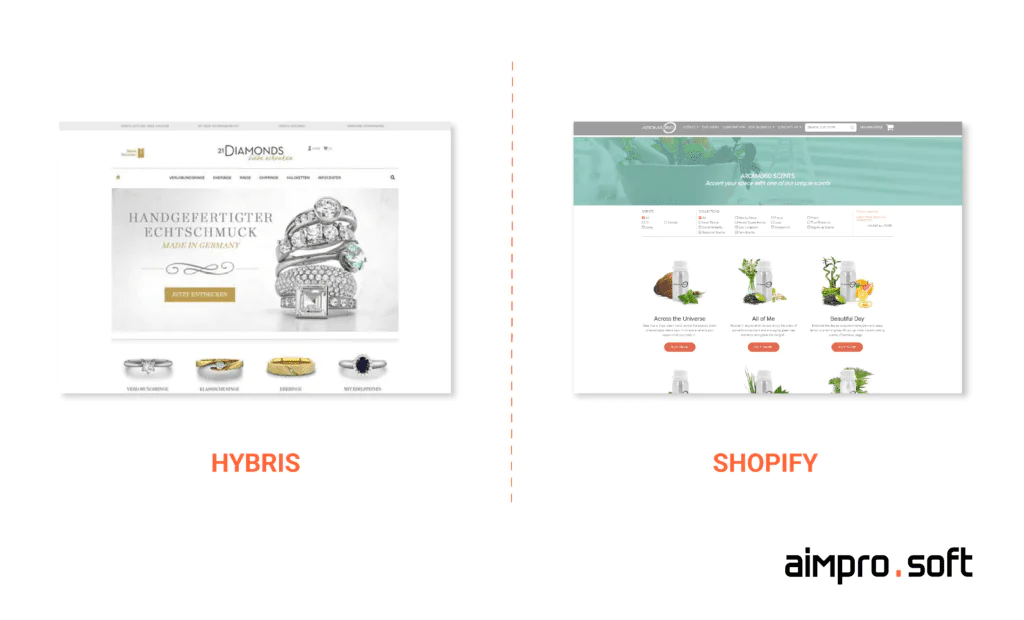
Hybris vs. Salesforce vs. Shopify: what to choose for your e-Commerce project?
As you can get from this brief overview, every single system has its pros and cons. Whatever platform you are considering for your e-Commerce project, SAP Hybris, Shopify, or Salesforce, you should evaluate what you have at the moment and your ambitions for the future. If you need a simple, modest but attractive online store, draw your attention to Shopify.
In case you want to make a shift from your outdated platform to the B2B-adapted one, Hybris is here with all that series of solutions for scalable merchandising. And finally, if you are a stubborn achiever who has gone beyond all possible borders in your niche, opt for Salesforce; its Demandware e-Commerce system is exactly what you’re looking for.
If you want to have a live talk with experts and figure out how to create a Hybris-based solution, consult on the relevance of SAP Hybris technology for your current project, or maybe you need to solve a particular problem (e.g., create a REST API in Sap Hybris Commerce to marry SAP Commerce with any application), no problems. We are open. The same applies regarding the consultations on Shopify and Salesforce-powered solution development.
Frequently Asked Questions
What is the price for the e-commerce platform?
Seems you’re looking for a one-size-fits-all answer. However, the price depends on your ambition first. Hosting, design, system setup and configuration, custom development, after-launch support and maintenance, staff training, etc., are those factors influencing the price. An e-commerce site will also require continuous investments in functional improvements of whatever software type (traditional, SaaS, custom) you choose.
What is the difference between on-premise and cloud-based e-commerce systems?
An on-premise e-commerce solution is provided for you on a license basis. You install it on your server and maintain with your in-house development team or outsource it. With a cloud solution, you pay for the software license and maintain it the same way, but all data is stored in the third-party server of the cloud-services provider.
Which platform is better for e-commerce enterprises?
Enterprise is highly load-dependent. They handle a massive traffic flux. The key requirements for the platform are excellent technical, installation, and troubleshooting support. Consider a credible software brand with a wide range of built-in features.
Why are enterprises moving to the cloud?
Moving to the cloud attracts enterprises for many reasons. Companies get stability while traffic overloads, speed for online sales processing, savings for maintenance, security compliant hosting for online payments, flexibility and faster time-to-market, fail-over of servers, and emergency secondary data centers.
What is the best platform for e-commerce business?
It depends on your type of business. It is enough an affordable and straightforward SaaS solution for beginners. If a business scales towards online presentation, whether it is a B2C or B2B model, companies often choose one of the leading software vendors. Hybris vs. Salesforce vs. Shopify comparison is given in this article.




